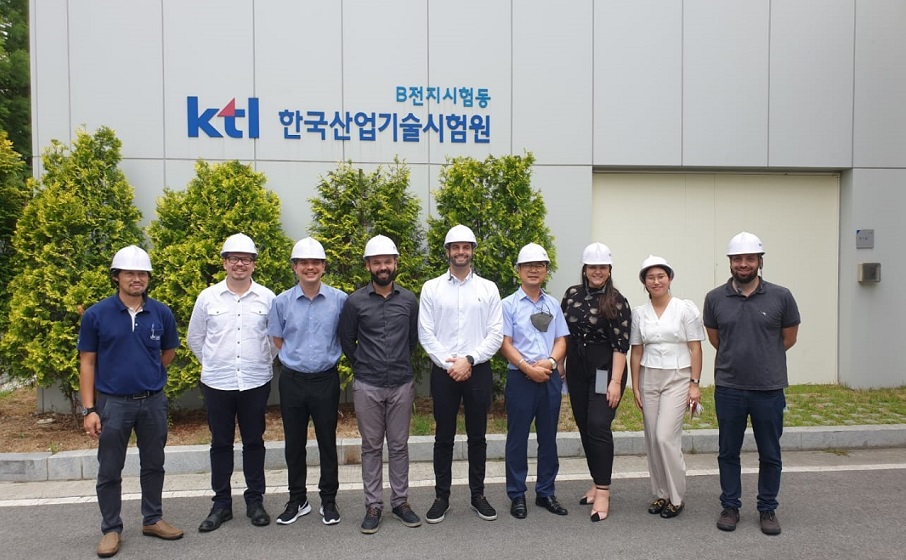The entourage with representatives of PUCRS, Inmetro and PCN seeks to strengthen the safe development of the electric vehicle market in Brazil

Entourage with representatives of Labelo-PUCRS, Inmetro and PCN is on a technical mission in South Korea / Photo: Release
Driven by the demand for sustainable mobility alternatives, the electric vehicle market is growing significantly, even after the economic impact of the pandemic caused by COVID-19. According to data from consultancy LMC Automotive, worldwide sales of electric vehicles have increased to 4.5 million in 2021 compared to 2.1 million in 2020.
According to the Brazilian Electric Vehicle Association (ABVE), in Brazil, sales rose 78% in the first quarter of 2022. The increase is also driven by the carbon emission reduction targets set by the international community, especially in Brazil due to the country’s electricity matrix, which originates 80% from renewable sources.
Despite the expansion, the sector still faces challenges as importing raw materials, technological development and strengthening the entire industry in Brazil. Among the fundamental aspects to enhance these improvements is the guarantee of safety and performance of vehicles for society.
As part of project development, members of the National Institute of Metrology, Quality and Technology (Inmetro), of PUCRS – supported by the complex of Specialized Laboratories in Electronics, Calibration and Testing (Labelo) – and the global PNC product certification group of South Korea, are part of a technical mission in the East Asian country. The aim is to improve, to strengthen and to develop knowledge in the area of control systems and energy storage system.
Throughout this week, the parties have signed a Memorandum of Understanding, which enables the exchange of knowledge and methodologies on the subject, as well as the access of teams to the most modern trends in electric mobility. The entourage also participated in a series of seminars that exposed the risks associated with the use of battery in vehicles, the quality standards to guarantee safety, the best practices of recycling (second life), and disposal of products.
The mission is another step towards the implementation of the first third-party laboratory for testing components connected to electric vehicles in Brazil, which may be inaugurated at the PUCRS Campus. The space, named E-mobility, might have an estimated initial investment of R$ 20 million.
“With the expansion of these technologies in the country, it is necessary to ensure the quality and safety of such equipment, in order to guarantee efficiency and minimize the risks of accidents to consumers. Thus, the meeting provides the knowledge exchange between the teams and it is of great importance for the implementation of the Brazilian laboratory, as well as regulations for certifications in the sector”, highlights the director of Labelo-PUCRS, Israel Teixeira.
Part of the group’s agenda took place at KTL, one of the largest and most technological laboratories of testing and conformity assessments in the world, linked to the Ministry of Commerce, Industry and Technology of South Korea. The teams were hosted by the president of the laboratory, equated to the deputy minister of the country, and by the engineers in charge of carrying out the tests.
The members of the technical mission had contact with the most advanced equipment and testing methodologies in the field. Visits were made to other advanced technology institutes in South Korea such as the KAIST (Korea Advanced Institute of Science & Technology) and the KATRI (Korea Automobile Testing & Research Institute).
Also in South Korea, the technical teams took part in training sessions divided into two topics; the first one, focused on electric vehicle charging stations, and the second focused on battery testing (the batteries used in electric vehicles, and the ones used in so-called BESS, which have various functions). Those batteries are linked to electro imposed for electric mobility, to sustainable power generation, to power distribution to remote locations use in industrial plants, among others.
Energy control and storage systems are essential to the development of renewable and sustainable energy technologies and integrate the components of electric vehicles (batteries), the infrastructure necessary for electric mobility with vehicle charging stations (electro stations). Besides that, the production of renewable energy, with the use of Battery Energy Storage Systems (BESS) in solar power plants, wind or hydroelectric power plants.
“In a short time, there will be a major advance in terms of electric mobility. In view of this process and technological developments in energy storage systems and other components related to electric vehicles, we have signed this cooperation with South Korean institutions, a country that has already advanced in this sector. That will allow the implementation of technologies to occur safely, without posing risks to car users, bike and electric scooter riders. Very soon, for example, loading vehicles in supermarkets, shopping malls and many other places will be part of people’s daily lives. Our effort is precisely to make that happen as safe as possible,” said Kim Rieffel, PCN’s CEO in Latin America.
In this sense, Teixeira adds that PUCRS participates in the mission in order to be technically qualified to set up a laboratory, test these products and ensure that this occurs safely in the country, which also ensures that the national industry has competitiveness through quality standards.
It is responsible for calibration of measuring instruments and conformity testing for product certification. According to its mission of preserving life through safety care, Labelo has contributed to guaranteeing the market the supply of goods and services that meet the quality criteria for the final consumer for over 50 years. It provides services to industry and contributes to guaranteeing the supply of goods and services that meet the quality criteria for the final consumer.